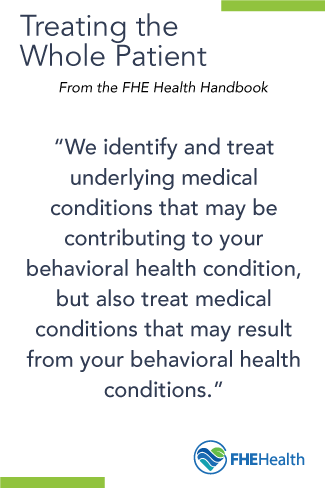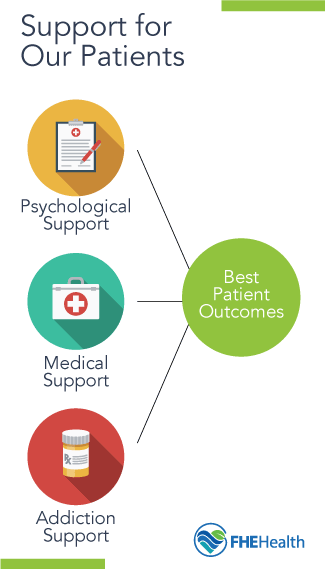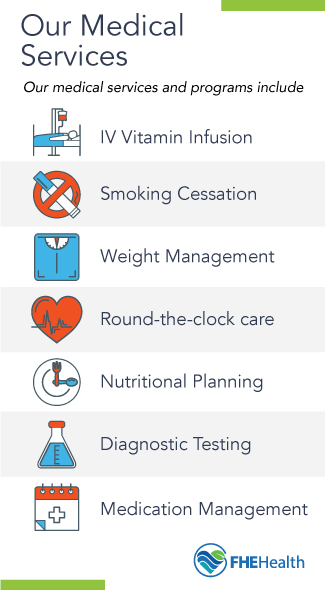Often, addiction treatment and mental health care focus on treating the behavioral aspects of a person’s well-being. Yet, at the heart of the process there must also be care for your body’s needs. Medical integration for treatment at FHE Health is designed to meet each one of your health needs while you are present and receiving addiction or mental health services. We have a team of on-site doctors who can treat most issues that commonly occur with addiction, recovery, and mental health.
When you turn to our team for addiction and health care, you gain insight into how to improve your body’s health and how to heal from the inside out. Detox and withdrawal can create a number of problems and risks, from sickness and nutrition to life-threatening complications. Our full team of doctors is available to help you with a continuous treatment program that provides care when it’s most needed.
Why Is Medical Integration Important for Addiction and Mental Health?

Mental health and addiction are often considered psychological or brain-related conditions. It’s true that your brain and central nervous system have a major impact on these disorders, the health and function of the rest of the body must also be treated simultaneously. Not only do physical ailments manifest as symptoms that can confuse mental health diagnosis, but the symptoms caused by mental health issues and addiction may cause medical issues that must be addressed to optimize healing and recovery.
The medical care we provide addresses the changes that have likely occurred in your body as a result of your substance abuse, anxiety, depression, or other mental health conditions. For example, years of drinking may cause damage to stomach lining, a painful malady that a patient was inadvertently treating with opiate abuse. Without a full treatment plan for the gastrointestinal pain the patient is suffering, they are more likely to continue seeking an illicit relief. Furthermore, when you have a general substance abuse disorder, the brain changes physically and chemically. The abuse makes you dependent on the external chemicals that are introduced, making it impossible for you to simply stop using drugs or alcohol without intense pain and withdrawal.
The traumatic effects of withdrawal cascade outward from the brain as it communicates to the other organs in your body. They, too, are struggling with the limited access to the chemicals they now depend on. The results can be devastating.
High-Risk Health Complications Can Occur
In some situations, detox and withdrawal can be deadly. Consider this example. In a study published by the National Institutes of Health, it was shown just how difficult a process alcohol withdrawal is. Alcohol withdrawal begins to occur just six hours after a person stops using the drug from their highest intoxication level. At that point, it is possible for the body to physically react in various ways.
Acute withdrawal symptoms include delirium tremens, instances in which the individual experiences hallucinations as well as dissociation. The mortality rate for those experiencing delirium tremens after not using alcohol is as high as 5 percent of all patients.
Seizures can also occur in this process, paralyzing your body in seconds and creating a high risk for complications. About 10 percent of those with a severe alcohol dependency develop this condition. Other dangerous complications include everything from cardiac arrest to mental health issues, and having a medical team available to you can counter such adverse effects with immediate help.
Medical Complications of Drug Abuse Range Widely
The complications associated with drug abuse are numerous. Addiction affects health, often leaving a long-lasting imprint on your body’s ability to function normally. The complications are numerous, but can include:
- Heart damage due to toxicity of drug use, sometimes leading to irregular heart rhythms, sudden cardiac arrest, and heart failure.
- Pulmonary complications including damage to the lungs; often with scarring that does not improve.
- Liver damage can develop especially in those who use DXM, alcohol, steroids, heroin, and inhalants.
- Kidney damage results from PCP, heroin, inhalant, ketamine, and other drug use.
- Gastro impacts include bowel tissue decay, reflux, severe constipation, and abdominal pain stemming from the use of drugs like khat, cocaine, alcohol, kratom, and LSD.
- Cancer can also occur especially neck, mouth, stomach, and lung cancer, especially from the use of tobacco, steroids, and marijuana.
Many people who suffer from drug and alcohol abuse have various degrees of these conditions. Yet, if and when they occur, FHE Health’s team of skilled doctors are there to help you to manage them.
Complications to Treatment – When Symptoms of Mental Health Disorders Limit Your Success
Having a team of professionals on hand also ensures that any symptoms that do occur are treated right away. In some situations, the symptoms of mental health disorders and addictions can manifest, limiting your success in the long term and success.
For example, many people who experience addiction health effects can feel they need to give up. The pain of withdrawal or the difficulty in coping with other side effects can limit their willingness to stay the course. When you have treatment directly available to you on-site this risk is minimized, and you’re empowered by getting needed care you need for any symptoms so you can focus on recovery.
Underlying Health Issues May Be the Reason for Self-Medication and Substance Abuse
Many people who come to FHE Health do so because of an addiction to drugs or alcohol or because they are suffering from depression and anxiety. Yet, in some cases, the reason these individuals are facing these health complications is an underlying health issue they have. For example, those with chronic pain often resort to painkillers to help minimize the pain, while those struggling with a lack of energy may turn to drugs for stimulation.
When you come into our location, you will receive optimized health care that focuses not just on your brain but your whole body. That means that if there is an underlying health issue that could have started you on the path to substance abuse, depression, anxiety, or other difficulties, you will get treatment for it here. In doing this, we can help facilitate your body to restore all aspects of your health.
Overprescription Can Complicate Your Recovery
Many men and women who try to turn to a local doctor or health care provider for their medical needs and then use our services for their addiction and mental health needs, find a lack of cohesive care. That is, it is very possible that you may be overprescribed medications that can limit health or recovery. By having all of your care in one place, you minimize the risk of this occurring. That ensures you have the best team working to support your needs in both addiction and health.
Benefits of Having Integrated Medical Care for Mental Health
Many primary care providers look for specific health indicators during routine visits. In most cases, these indicators have to do with physical health, such as high blood pressure or changes in weight. Patients typically only receive mental health support when they specifically ask to be screened for a condition such as anxiety or depression.
If a patient is screened and the doctor believes they have symptoms consistent with a mental illness, the doctor may either prescribe medication or give a referral for mental health services. Unfortunately, once a patient begins treatment with a mental health professional, their doctor is usually left out of the loop. This makes it difficult for the primary care provider to monitor ongoing symptoms and observe connections between physical and mental wellness.
With integrated care with mental health, physicians and behavioral health clinicians work together to provide more robust support. This approach makes it easier to treat co-existing conditions, such as depression that occurs alongside chronic pain. It also makes it easier for providers to more effectively handle the physical and mental side effects of medication.
What Are Common Physical Health Conditions that Need Attention with Mental Health
There is a strong connection between mental health and physical health. While physical side effects can be connected to illnesses in the body, they can also stem from mental illnesses.
Common physical health conditions that may be related to mental health include:
- Tiredness
- Dizziness
- Irregular heartbeat
- Shortness of breath
- Sleep disruptions
- Dry mouth
- Muscles aches and tension
- Trouble with memory
- Weight fluctuations
- Increased pain sensitivity
- Weakened immune system
- Hyperactivity
Conditions such as these often occur alongside mental illnesses such as bipolar disorder, anxiety and depression. Through collaborated care for mental health, health care providers can treat the mental illness while monitoring physical symptoms and side effects from medication.
How Untreated Physical Conditions Can Worsen Mental Health Conditions
In some cases, mental illnesses cause physical symptoms. Other times, physical conditions lead to mental health issues. For example, chronic pain can result from conditions such as nerve damage, multiple sclerosis or arthritis. According to a study from Harvard Health, those who live with chronic pain are three times more likes to develop a mental illness such as depression or anxiety.
For those who have a mental illness, physical side effects such as poor sleep and increased pain sensitivity can worsen psychiatric conditions. This cycle can be hard to treat for a primary care provider who’s not experienced in treating mental illnesses. Combining mental health and medical care ensures that health care providers treat the root of the problem rather than just the symptoms.
A Strong Baseline of Care Can Enhance Your Success During Recovery
There is no confusion here. The long-term effects that addiction creates can limit your success in recovery. If you have medical health problems and you seek out care for them, but do not address the underlying health problems causing them, you again limit your success. Yet, when you enter our treatment program at FHE Health, you create a strong baseline from which your care can build.
By using our services, our medical integration will address health issues that could limit your long-term success. The first step is to address any existing and underlying health complications you have. Then, a customized treatment plan is created to address the mental and physical aspects of your current health.
As a result, you get the very best chance at long-term recovery. No matter where you are right now, care is available to help you move beyond those limitations towards a path of wellness and recovery.
What You Can Expect from FHE Health
At FHE Health, we use an integrated care model. This means that you or your loved one will receive medical care right alongside all of the treatment programs we offer. For those who need mental health treatment or addiction treatment, having on-site support is critical. Our team is here to support each one of your needs on the path towards recovery.










